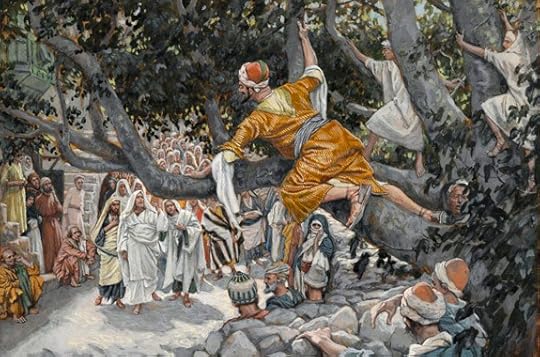Zacchaeus, the Silly Tree, and the Meaning of Life

"Zacchaeus
in the Sycamore Awaiting the Passage of Jesus" (Zachée sur le sycomore
attendant le passage de Jésus) by James Tissot, late 1800s. (Brooklyn
Museum/Wikimedia Commons)
A Scriptural Reflection on the Readings for Sunday, November 3, 2013 | Carl E. Olson
Readings:
• Wis 11:22-12:2
• Ps 145:1-2, 8-9, 10-11, 13, 14
• 2 Thes 1:11-2:2
• Lk 19:1-10
“That’s a good question. I’ve
never really thought about it.”
The remark was made a number of years
ago by a forty-year-old relative who had been asked, “What do you
think is the meaning of life? Why are we here?” His honest answer
shocked me. After all, he was an intelligent and well-educated man;
surely he had pondered the mystery of his existence at some point in
his life!
Sadly, some people do not. Or at least
try not too. But most people, in some way or another, do ask the big
questions of life: Who am I? Why am I here? Why do I exist? The
author of the Book of Wisdom certainly pondered these questions. We
don’t know his name, but he was apparently a well-educated Jewish
author living in or around Alexandria, Egypt, between 50 to 180 years
prior to the birth of Jesus. He tackled big issues, including
exhorting fellow Jews to live holy lives, defending the existence of
a just and all-powerful God, and denouncing the materialism,
skepticism, and idolatry so prevalent among the pagans (and some
Jews) of his day. He was educated in Greek thought and rhetoric, and
he often used Hellenistic terms and ideas of defend his beliefs in a
Creator, providence, and divine judgment.
In today’s reading from the Book of
Wisdom, the author emphasizes two seemingly disparate qualities of
God: His omnipotence, or all-powerful nature, and His love for His
creation. On one hand the Lord is so great that all of creation is
but a fleck of dust or drop of water; on the other hand, He loves
everything that He has fashioned and He upholds it all by His loving
will. He is, the author writes, both Lord and “lover of souls.”
The author then makes a point that appears several times in the Book
of Wisdom: man’s disbelief in God is not a matter of intellectual
weakness as much as it is a matter of moral failure. Man is a
creature with a built-in need to worship someone or something. The
rejection of God means the acceptance of false gods. Even those
materialists who say there is no God or gods end up worshipping false
idols of one sort or another, including power, science, money, or
pleasure. Or even themselves.
In the face of a vast universe, what is
man’s response to his own existence? The author of the Book of
Wisdom says that humility, thanksgiving, and right living are the
only reasonable responses to the mystery of life. Likewise, the
Psalmist declares, “Let your works give you thanks, O Lord, and let
your faithful ones bless you.” The story of the chief tax collector
Zacchaeus and his encounter with Jesus, found only in Luke’s
Gospel, touches on similar themes.
Like the rich young ruler depicted
a chapter prior (Lk 18:18-23), Zacchaeus is rich and powerful. But as
a tax collector, who practiced a profession known for corruption and
injustice, it would have been difficult for Zacchaeus to claim that
he had kept the Law perfectly, as the rich young ruler had. Yet there
was something different about Zacchaeus, who “was seeking to see
who Jesus was.” The crowds, it seems, were there out of mere
curiosity, but Zacchaeus had a deep desire to truly understand and
know Jesus. And in seeking Jesus, this wealthy man had no qualms
about making a fool of himself in public.
“He ignored the crowd
that was getting in his way,” Augustine said in a sermon, “He
instead climbed a sycamore tree, a tree of ‘silly fruit’.”
After meeting Jesus, the tax collector promises to give generously to
the poor and to repay fourfold anyone he may have defrauded.
What is the meaning of life? The answer
is found when we acknowledge our Creator and seek the Savior. “Say
what you like,” said Augustine, “but for our part, let us climb
the sycamore tree and see Jesus.” That is something to really
think about.
(This "Opening the Word" column originally appeared in the November 4, 2007, issue of Our Sunday Visitor newspaper.)
Carl E. Olson's Blog
- Carl E. Olson's profile
- 20 followers



